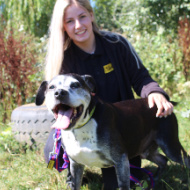
Cross breeds were the most adopted dogs.
The UK's largest dog welfare charity, Dogs Trust, has shared its rehoming statistics for 2022, with 10,151 dogs rehomed in the 12 months.
With around 1750 dogs in the charity's care at any time, the average amount of time dogs stayed with the charity was 46 days.
The longest staying resident in 2022, a German shepherd cross named Tucker, was adopted this year following 2,542 days at Dogs Trust Shrewsbury.
Chief executive of Dogs Trust, Owen Sharp, said: “This year has seen a greater demand for our services than ever before. But alongside the difficult decisions we’ve seen dog owners forced to make, there’s been some real moments of joy too.
“Thanks to the amazing work of staff at our 21 rehoming centres, supported by a team of hard-working volunteers and foster carers, we have helped over 10,000 dogs to find new homes.
“Some of them have gone on to be family pets, some have found retirement homes. And others have gone on to find new carers as support dogs, police dogs and even theatre stars!”
Coco Chanel, a chihuahua adopted this year from Dogs Trust Leeds, went on to star as Bruiser Woods in Legally Blonde: The Musical at the Theatre Royal in Wakefield.
Over the course of the year, 389 puppies have been born in Dogs Trust kennels, with the majority of these being dachshunds.
In 2022, the oldest dog cared for by the charity was Ty, a 22-year-old Staffordshire bull terrier Dalmatian cross who was adopted from Dogs Trust Bridgend.
Alongside its rescue and rehoming work, Dogs Trust has also provided training to 14,304 dogs this year.
Owen continued: “On behalf of everyone at Dogs Trust, we’d like to wish our supporters and the nation’s dogs a very Happy New Year and look forward to helping many more four-legged friends to find their new homes in 2023.”
Image (C) Dogs Trust



 The RCVS has announced a new version of its 1CPD mobile app, with enhanced features for veterinary surgeons and veterinary nurses to record their continuing professional development.
The RCVS has announced a new version of its 1CPD mobile app, with enhanced features for veterinary surgeons and veterinary nurses to record their continuing professional development.